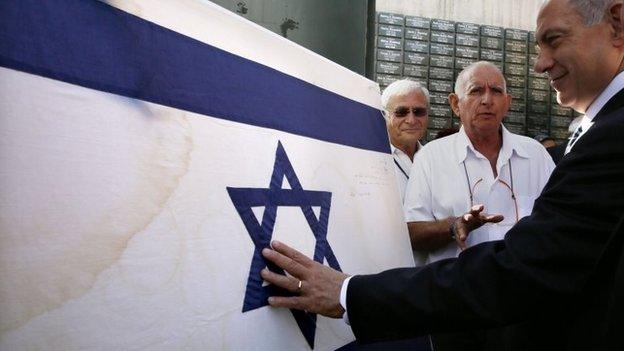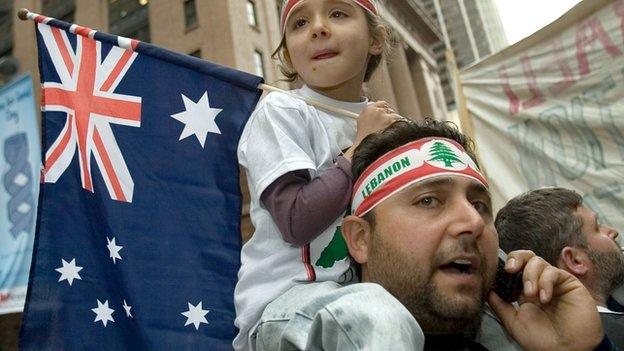Israel and Australia: New best mates?
- Published

Israeli Prime Minister Netanyahu has been full of praise for Australia
Australia has a lot of best friends. Sometimes it's Japan, external. Sometimes it's Indonesia, external. Sometimes it's China, external.
Now, though, the Israeli Prime Minister Benjamin Netanyahu thinks he might have found a new best mate Down Under.
After a quick call to congratulate the new President of Egypt Abdul Fattah al-Sisi on his election victory, which many regard as far from democratic, Mr Netanyahu singled out Australia for high praise at his weekly cabinet meeting in Jerusalem on Sunday.
It came after Australia last week stepped into the always-combustible territory of Middle Eastern linguistics, and seemingly changed its position regarding whether East Jerusalem is "occupied".
Last week the Australian Attorney General George Brandis issued a statement , externalsaying: "The description of East Jerusalem as 'Occupied East Jerusalem' is a term freighted with pejorative implications which is neither appropriate nor useful."
The statement was made in consultation with the Australian Foreign Ministry, after Mr Brandis had been challenged in parliament over his failure to refer to East Jerusalem as occupied.
.jpg)
Recently Tony Abbott has also been trying to shore up relations with Indonesia
Mr Netanyahu was quick to offer his appreciation, external of Australia saying the remarks had taken "courage" and calling it "refreshing given the chorus of hypocrisy and ignorance".
The Israeli Prime Minister's spokespeople took to the twittersphere, external to reiterate the thank you message.
Others though were not best pleased.
The Palestinian Authority reportedly summoned Australia's representative to explain the change in position.
The Palestinian Foreign Minister Riyad Al Maliki called it, external a "radical change in Australia's position on Palestine".
Independent Australian Senator Nick Xenophon said it was "an extraordinary and reckless departure from the bipartisan approach of the last 47 years".
"Even Israel's strongest ally, the United States, does not hold this position," he added.
Jerusalem is at the heart of the Middle East's most intractable conflict between Israelis and Palestinians.
The Old City in East Jerusalem contains some of the holiest sites of Islam, Judaism and Christianity.

Australia has a large Arab population, particularly from Lebanon
Israel captured East Jerusalem along with Gaza, the West Bank, the Golan Heights and the Sinai Peninsula during the 1967 Six Day Arab Israeli war.
East Jerusalem was annexed by Israel taking full control.
The Sinai was returned to Egypt under a piece deal signed in 1979.
Almost the entire international community, including the United States, does not recognise Israel's annexation of East Jerusalem
The United Nations and the International Court of Justice regard East Jerusalem as occupied territory.
President Obama has called for, external the ending of "the occupation, which began in 1967". Although in his speech to the United Nations General Assembly he did not specify if he was referring to East Jerusalem.
The United States, European Union and the United Nations all believe a future Palestinian state should be based around the pre-1967 borders.
The Palestinians want East Jerusalem to be their future capital.
Israel regards a "United Jerusalem" as its capital although most countries do not accept this and have their embassies based in Tel Aviv.
Australia has not said whether it will move its embassy from Tel Aviv to Jerusalem.
'Strong supporter'
So Australia is seemingly going out on a limb.
The country has long been regarded as a strong supporter of Israel.
Along with Israel, Australia was one of only 14 out of 194 UN members to oppose Palestine becoming a member of Unesco, the United Nations education, and scientific and cultural organisation in 2011.
Australia abstained from the vote in 2012 that saw Palestine become a "non-member observer state". Forty other UN members abstained. 138 voted in favour and 9 voted against.
Australia's support for Israel is contentious here.
The former Labor Foreign Minister Bob Carr has recently said, external that extreme right-wing Israeli lobbyists here had an extraordinary influence on Australian policy in the Middle East under former Prime Minister Julia Gillard that he regarded as "very unhealthy."
Mr Carr's comments were strongly criticised by the Israeli government and some of the country's supporters.
Why Australia has chosen now to change its position is not clear.
It's possible Mr Brandis was speaking off the cuff or out of turn, but the clarifying statement suggests not.
The country has a relatively small Jewish population of about 100,000 (0.4% of the total).
The Arab population is much larger: roughly 300,000 people, mostly of Lebanese origin, but including around 7,000 Palestinians.
Israel's critics will say the change on policy shows the influence of the lobby group Mr Carr talked about.
The US Secretary of State John Kerry said continued expansion of Jewish settlements, external in East Jerusalem and the West Bank was one of the primary reasons for the collapse of recent peace talks.
Israel has been warned it is currently facing increasing international isolation.
That's why the Israeli government will value the fact that it still has a friend in Australia.